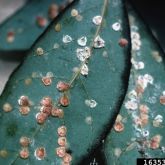Pyriform scale
Alert
Have you seen Pyriform scale? Be on the lookout and report it.
Under Queensland legislation, if you suspect the presence of Pyriform scale, you must report it to:
- Biosecurity Queensland on 13 25 23
- or
- the Exotic Plant Pest Hotline on 1800 084 881.
Movement restrictions are in place to prevent pyriform scale from being introduced into Queensland.

Mature female pyriform scale insects
John .A. Davidson, Univ. Md, College Pk, Bugwood.org

Adult pyriform scale
United States National Collection of Scale Insects Photographs, USDA Agricultural Research Service, Bugwood.org

Immature pyriform scale insects
United States National Collection of Scale Insects Photographs, USDA Agricultural Research Service, Bugwood.orgcts Photographs, USDA Agricultural Research Service, Bugwood.org

Nymph and adult pyriform scale insects
United States National Collection of Scale Insects Photographs, USDA Agricultural Research Service, Bugwood.org
Pyriform scale is a sap-sucking scale insect that poses a threat to a range of Australian horticulture industries.
This pest can feed on many horticultural, ornamental and native plants.
It produces large amounts of honeydew on which sooty mould can grow.
Pyriform scale infestation results in poor plant growth, leaf drop and a reduction in fruit size and quality.
Cause
Pyriform scale (Protopulvinaria pyriformis) is a soft scale insect.
Other names
- Heart-shaped scale
Description
Adult
- Raised, scab-like on the underside of leaves.
- Pear-shaped (or heart-shaped).
- Yellowish-brown to darker brown with a characteristic white fringe.
- 2–4mm long.
Nymphs
- Similar to adults in shape, but more flattened.
- Initially translucent green, changing to light green with age.
- Early-stage nymphs are commonly called 'crawlers' because they have legs and are able to move short distances within or between trees.
Egg
- Carried beneath the adult female's body.
Plant stage and plant parts affected
- All plant stages from seedling to mature plants are affected.
- Predominantly affects leaves and fruit.
Plant damage
- Direct feeding on plant sap which affects the ability of the plant to take up nutrients.
- Poor plant growth.
- Leaf drop.
- Reduction in fruit size and quality.
- Indirect damage is caused by the growth of sooty mould on the honeydew secreted by the scales.
- Sooty mould covers leaves and fruit, reduces the amount of sunlight available to the plant for growth.
May be confused with
Other scale insects with a similar shape may be confused with pyriform scale.
Pyriform scale requires expert identification. Report pear-shaped/heart-shaped scale insects to 13 25 23.
Distribution
Pyriform scale has a widespread distribution that includes Africa, South, Central and North America, Europe and the Middle East.
Pyriform scale has been detected in Western Australia. The pest has not been found in Queensland.
Hosts
Pyriform scale can infest a broad range of horticultural, ornamental and native host plants from over 34 plant families including:
- avocado
- banana
- bauhinia
- camellia
- canna
- citrus
- coffee
- eucalyptus
- fig
- frangipani
- gardenia
- guava
- hibiscus
- ivy
- laurel
- lilly pilly
- mango
- myrtle
- orchids
- passionfruit
- papaya
- pomegranate
Life cycle
- The entire lifecycle usually takes place on the lower leaf surface.
- Females are able to reproduce without males (asexual reproduction).
- Each female can lay up to 300 eggs, which she carries under her body.
- Nymphs hatch from the eggs and settle on lower leaf surfaces to feed.
- Nymphs go through 3 growth stages (instars) before reaching adulthood.
- Crawling nymphs and female adults are capable of movement.
Impacts
Pyriform scale can infest a broad range of plants, causing poor growth, and reducing production and yield. This pest poses a threat to Australia's avocado, citrus, mango, banana, passionfruit, forestry and nursery/garden industries, as well as to our urban and natural environments.
How it is spread
Moving infested host plant material, such as pot plants, can spread this pest.
Localised spread can also occur within and between plants and trees as the nymphs and adults are able to crawl and may also be blown in the wind.
Monitoring and action
Check for the presence of pyriform scale on plants:
- that are stunted and unthrifty
- with excess honeydew and/or sooty mould
- with excessive ants
- with excessive leaf or fruit drop.
Look for pear-shaped, raised scab-like scale insects, up to 4mm long, on lower leaf surfaces.
Report suspect pyriform scale to Biosecurity Queensland on 13 25 23.
Prevention
- Comply with interstate movement restrictions to prevent pyriform scale from spreading.
- Always source plant propagation material from a trusted source and check the plants before you buy them or on arrival to ensure they are pest and disease free.
- Monitor the health of your plants and immediately report suspect priority plant pests or diseases.
- Practise good biosecurity – ensure your equipment and machinery is clean before taking it to other properties and inspect equipment or machinery on arrival to your property to ensure it is clean and free of pests, plant material or soil.
- Protect your farm from emergency plant pests.
- Biosecurity manual for the nursery production industry (PDF, 3KB).
- Learn how to protect your plantation in the Biosecurity manual for the plantation forests industry (PDF, 2.4MB).
- Visit the farm biosecurity website.
Legal requirements
Pyriform scale is prohibited matter under the Biosecurity Act 2014.
Report suspected pyriform scale to Biosecurity Queensland immediately on 13 25 23 or contact the Exotic Plant Pest Hotline on 1800 084 881.
If you think you have found pyriform scale, you must take all reasonable and practical steps under your control to minimise any associated risks. This is called a general biosecurity obligation (GBO).
Movement restrictions are in place to prevent the introduction of pyriform scale to Queensland.
You need a biosecurity certificate to bring host plants into Queensland from Western Australia.
The Queensland Biosecurity Manual (PDF, 1.4MB) outlines the potted plant varieties affected and the risk minimisation measures that must be taken.